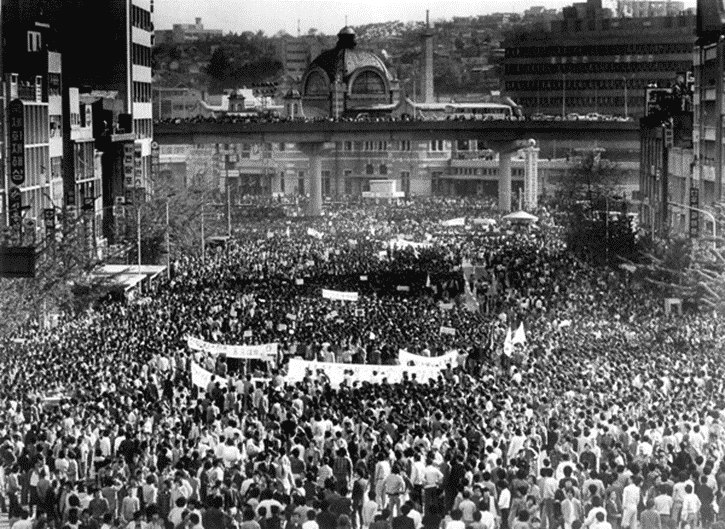The 2023 cinematic year in Korea ended with two movies portraying Korean military history: “12.12: The Day” (alternative title: “Seoul Spring”) and “Noryang: Deadly Sea.” With more than 5 million tickets sold in the first two weeks of its release, “12.12: The Day” was hailed as one of the top-grossing movies theatrically released in South Korea last year. “Noryang: Deadly Sea,” the last movie set in a trilogy on national hero Yi Sun-sin covering his famous last battle, was also released on the big screen right before the end of 2023.
How are these military histories portrayed and what does this say about contemporary Korean understanding of the past? Spoilers ahead while we attempt to uncover the popularity of Korean military cinema.
“12.12: The Day” (“Seoul Spring”)
12.12: The Day (2023) 서울의 봄 Movie Trailer | EONTALK
A theatrical piece about the unfolding of the Dec. 12, 1979, coup d’état has long been overdue. As an important pivot in the political history of South Korea, the coup d’état marked the beginning of the end of the Seoul Spring. The assassination of dictator President Park Chung-hee in 1979 led to a power vacuum. Hopes and aspirations for the democratisation of South Korea by the public were quickly suppressed by the military. The military meanwhile had its own internal power struggles. This would accumulate in what was dubbed the longest coup d’etat in history, which started with the events on Dec. 12, 1979, ending with the inauguration of Chun Doo-hwan as president in May 1980. While the movie is not entirely historically accurate in depicting the day, it attempts to accurately reimagine the events and characters in the first half while, without deviating from the historical outcome, fantasising about a possible flow of events in the latter half.

The movie poster for “12.12: The Day” with characters General Chun Doo-kwang (top) and General Lee Tae-shin. Source: Plus M Entertainment
The first half establishes the two central figures in the conflict and their motivations, as well as their networks within the military. The audience’s attention is quickly focused on two generals with very different backgrounds: Chun Doo-kwang and Lee Tae-shin, who are based on the historic figures Chun Doo-hwan and Jang Tae-wan respectively. As most are aware of the outcome of the conflict, the movie no longer needs to establish who of the two is the antagonist within this story.
Chun is the leader of the Hanahoe, a clique of high-ranked officers within the military, and the movie centres on how he leads this group to victory in their struggle for control over the military and government. This inner network, exclusively composed of graduates from the Korea Military Academy, is portrayed as chaotic and hierarchical, with one strong leader and a bunch of followers who constantly need to be convinced of the stakes at hand.
Throughout the comedic portrayal of these chaotic good-for-nothings in the first half of the movie, the audience is almost convinced the genre is a black comedy with a sharp critique of Korean militarism.
It is in the action-packed second half that they become portrayed as ambitious soldiers who hope to gain more than military prestige—they want to take over the government.
As they are opposed by General Lee Tae-shin, he is automatically equated with being good. He confronts the coup with his loyal regiment at Gwanghwamun in the centre of Seoul, a spot famous for the candlelight vigils that led to the downfall of Park Geun-hye’s government. This confrontation ends in his arrest and with him, the last resistance against Chun’s power grab is seemingly out of the way. Although this part of the movie is entirely fictional, the plot then turns into nothing more than a conflict between a “good” and “bad” soldier, performing the opposite of what seemingly was a critique of militarism.
To exist, states demand sacrifice. In “12:12 The Day,” Lee is the embodiment of this necropolitics. The goodness of Lee is composed of several layers. In his opposition against the coup, he is portrayed as a loyal soldier. At the beginning of the movie, we see him reject advances by Chun, replying to his offer to join his side as “all soldiers of the Korean military are on the same side.” He is also portrayed as a loyal husband and father, but one who embraces his family by letting them go for the sake of fighting for his justice: saving the government.
The good is equated with being a true patriot whose patriotism is made whole not only by being a pater familias but by the ultimate sacrifice of himself: death. This portrayal of Lee’s fight reveals what the movie embodies in its core, namely a deep-rooted patriarchal militarism.
“Seoul Spring’s” plot ends where the real-life Seoul Spring begins, with masses of students protesting for a democratic future after the spring semester started in March 1980. While this was a period where citizens and their democratic aspirations were vocally expressed, the movie “Seoul Spring” instead shows a passive citizenry who watches as a military power play unfolds from top to bottom.
The spirit of the Seoul Spring is thus tainted with the legacy of military infighting for power and control over the state and its citizens, instead of doing it justice by showing the efforts of the people to restore democracy. In reality, it is only the indefatigable fight of the citizenry for a more inclusive form of government that has allowed South Korea to become a robust democracy.
“Noryang: Deadly Sea”
NORYANG: DEADLY SEA | Official Trailer | Starring KIM Yun-seok, BAEK Yoon-sik, & JUNG Jae-youn
In an ironic twist, General Jang Tae-wan’s character name Lee Tae-shin was inspired by Admiral Yi Sun-shin. As the last movie in a trilogy inspired by the historical epic of naval commander Yi Sun-sin, “Noryang: Deadly Sea” bears the heavy burden of having to kill Yi in his last naval battle against the retreating Japanese military forces. Even more so than in “Seoul Spring,” it is immediately clear which characters are the antagonists and protagonists.

A poster for “Noryang: Deadly Sea” shows Admiral Yi hitting the war drum. Source: ACEMAKER MOVIEWORKS
As the Japanese invasion of the late 16th century was particularly brutal, Yi and his naval forces are regarded as the saviour of the Korean nation. Admiral Yi’s tactical brilliance far outshines the other commanders in the movie, making the plot almost unbelievable—were it not for the years of education on Yi and his achievements that all Koreans have gone through. A story about Admiral Yi does not need any unrealistic made-up mistakes to increase tension or dampening of his military achievements believing the audience would find his brilliance unrealistic. It definitely does not need a fantasy spin on his motivations to justify his military record, as there are plenty of letters, diaries, and court records written by Yi himself. Yet while this movie trilogy is an ode to him, it is unfortunately not always a historically accurate one.
Korean anti-Japanese sentiment is deeply rooted in history and the director of “Noryang” is aware of this. Despite not being present in the actual battle, the moment the famous (almost) indestructible turtle ship appears to smash the enemy into literal pieces, the captivated audience momentarily loses its immersion as they appear with a speed far-exceeding any possible historical reality.
This is quickly forgiven, as watching Yi and his naval forces pound the Japanese ships with pre-modern ordinance immediately brings back the excitement. It is almost as if the expectations of the director about this excitement went too far, as even these scenes start to feel long and heavy after having seen about a hundred ships sunk to the bottom of the sea. There are long single-take action scenes with hand-to-hand combat on the decks, but knowing the outcome of the battle and seeing the overweight of the Korean side hampers the development of any real tension.
Thus the focus shifts on Yi and his motivations. Not only does he fight for his nation (everybody already expects this), but he is also a devoted family man. The death of his son at the hands of some Japanese soldiers haunts him in his sleep and is seemingly the motivation behind his merciless pursuit of a demotivated and already defeated Japanese military. The moment of catharsis is finally bestowed upon him as he dies in battle, welcomed by his son, seeing his fellow soldiers forgive him, and the war drum picked up by his second son and continuously beaten as if he never left. The emotional response the director forcefully demands out of the audience leaves one drained and tired. Again, death is the only salvation for a patriot and we are to be emotionally invested in his prudent sacrifice (or else be considered unpatriotic).
Where are the women?
Both movies are distinctly gendered and masculine. There are only two notable female characters that show up in both movies: the wives of the protagonists General Lee and Admiral Yi.
General Lee’s wife, who is not even given a name, is seen preparing his clothes, making sure the stew is warm, and waiting for him to come home. She is left wondering why he tells her he will not be coming home again, as he does not tell her anything about the political chaos and the coming storm. Without asking more questions, she only tells him to take care of his health and sleep with a warm blanket. Lee Tae-shin, preparing to face the coup with the small number of loyal soldiers left, is seen looking melancholically at the scarf his wife gave him. As he puts it on and as he walks out, General Lee puts on the identity of a loyal husband and father over his military uniform as he rejects the last offer to stand down for “his smart son.”. While on his way to choose country and pride over his own family, the mother is again left home, unknowing what is about to unfold, confronted with the consequences offscreen, outside of the history books.

Bang Sujin, Admiral Yi’s wife, is portrayed by actress Moon Jeong-hee in the movie “Noryang: Deadly Sea.” Source: CGV
The wife of Yi, Bang Sujin, is distinctly portrayed as a mother and housewife in the only scene she is in the movie. She is seen cooking medicinal soup for Yi when she visits him after the news that their youngest son has just passed. She watches over his side when he sleeps and the moment she leaves to answer a calling by a servant, Yi wakes up to tell her that he met their son in his sleep. Bang replies she wishes he would sometimes pay her a visit as well and quickly leaves the room. Yi is not only the protector of the nation but the head of a household, and is seemingly haunted by the loss of his son. Bang is not offered the same solace of military revenge and is instead reduced to supporting her husband in his vengeful march against the Japanese military.
In the end, both movies are representations of the degree to which nationalism, gender and politics are entangled in contemporary South Korea. The one-dimensional narrative of hero versus villain only holds as long as our view of the world remains without a critical lens. Korean cinema shines when it continues to look for those who are not on the screen, between the lines, and behind the curtains; I welcome any attempt at a rendition of a Korean historical epic for the big screen that takes this leap forward.






